Super Smash Bros. Ultimate
- "SSBU" redirects here. For the Wii U version of Super Smash Bros. 4, see Super Smash Bros. for Wii U. For the team, see Team:Super Smash Bros. University.
| Super Smash Bros. Ultimate | |
|---|---|
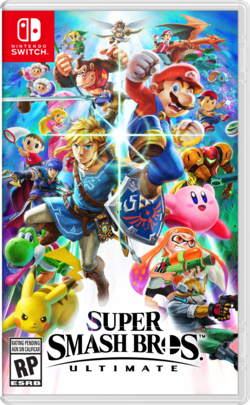
| |
| Publisher(s) | Nintendo |
| Projected release date | December 7, 2018 |
| Genre(s) | Fighting |
Super Smash Bros. Ultimate (大乱闘スマッシュブラザーズ SPECIAL) is an upcoming fighting game for the Nintendo Switch. It was first announced on March 8th, 2018 at the end of the Nintendo Direct released the same day. It will be the fifth installment in the Super Smash Bros. series (sixth if both versions of Super Smash Bros. 4 are counted as two games). The game is scheduled to release on December 7, 2018.
Trailer
The first teaser trailer was revealed at the end of the Nintendo Direct on March 8th, 2018. It suggested that Inklings were newcomers to the game (although this had not yet been explicitly confirmed at the time).
Confirmed elements
Characters
All 63 characters from all four Smash Bros. games return as playable characters. Inkling, with Boy and Girl designs from the original Splatoon (as well as Splatoon 2), has been confirmed to appear in the game. Ridley is confirmed to be a playable character with both Meta & Proteus Ridley as alternate costumes. Playable clone characters are now described as "Echo Fighters" and are marked with an epsilon symbol (ε); Daisy is confirmed to be an Echo character of Peach.
| Veterans (65) | |||||||||||||||
|---|---|---|---|---|---|---|---|---|---|---|---|---|---|---|---|
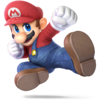 Mario |
 Luigi |
 Peach |
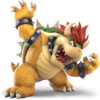 Bowser |
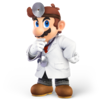 Dr. Mario |
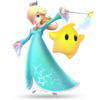 Rosalina & Luma |
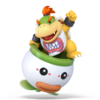 Bowser Jr. |
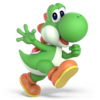 Yoshi | ||||||||
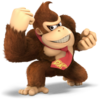 Donkey Kong |
 Diddy Kong |
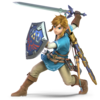 Link |
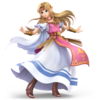 Zelda |
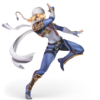 Sheik |
 Ganondorf |
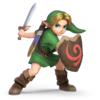 Young Link |
 Toon Link | ||||||||
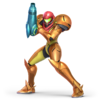 Samus |
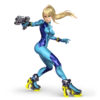 Zero Suit Samus |
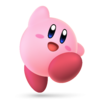 Kirby |
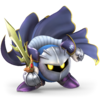 Meta Knight |
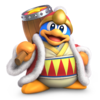 King Dedede |
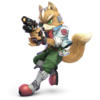 Fox |
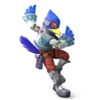 Falco |
 Wolf | ||||||||
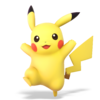 Pikachu |
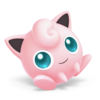 Jigglypuff |
 Mewtwo |
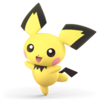 Pichu |
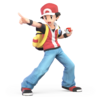  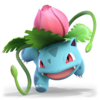 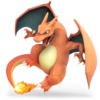 Pokémon Trainer (Squirtle, Ivysaur, Charizard) | |||||||||||
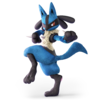 Lucario |
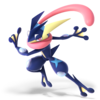 Greninja |
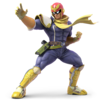 Captain Falcon |
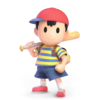 Ness |
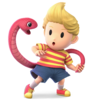 Lucas |
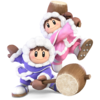 Ice Climbers |
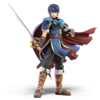 Marth |
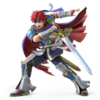 Roy | ||||||||
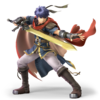 Ike |
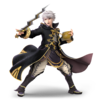 Robin |
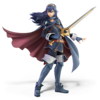 Lucinaε |
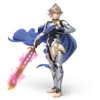 Corrin |
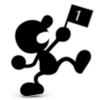 Mr. Game & Watch |
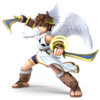 Pit |
 Palutena |
 Dark Pitε | ||||||||
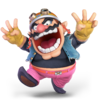 Wario |
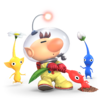 Olimar |
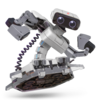 R.O.B. |
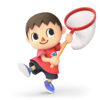 Villager |
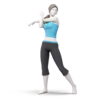 Wii Fit Trainer |
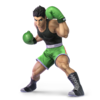 Little Mac |
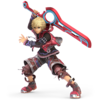 Shulk |
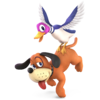 Duck Hunt | ||||||||
 Snake |
 Sonic |
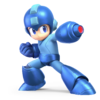 Mega Man |
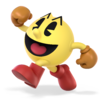 Pac-Man |
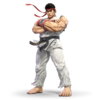 Ryu |
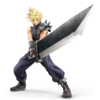 Cloud |
 Bayonetta |
|||||||||
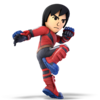 Mii Brawler |
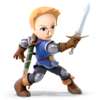 Mii Swordfighter |
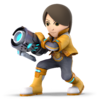 Mii Gunner |
|||||||||||||
| Newcomers (24) | |||||||||||||||
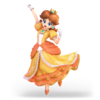 Daisyε |
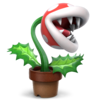 Piranha Plant (DLC) |
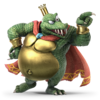 King K. Rool |
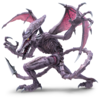 Ridley |
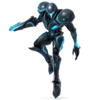 Dark Samusε |
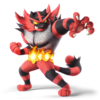 Incineroar |
 Chromε |
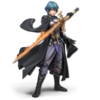 Byleth (DLC) | ||||||||
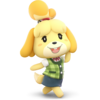 Isabelle |
  Pyra/Mythra (DLC) |
 Inkling |
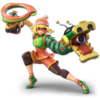 Min Min (DLC) |
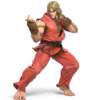 Kenε |
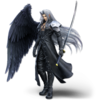 Sephiroth (DLC) |
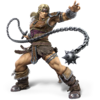 Simon | |||||||||
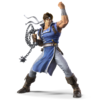 Richterε |
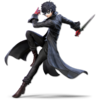 Joker (DLC) |
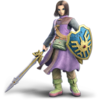 Hero (DLC) |
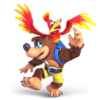 Banjo & Kazooie (DLC) |
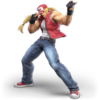 Terry (DLC) |
 Steve (DLC) |
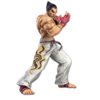 Kazuya (DLC) |
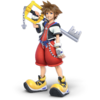 Sora (DLC) | ||||||||
Bold denotes starter characters.
"ε" denotes Echo Fighters.
Stages
New Items
- For the entire confirmed list of items, see Items page.
- Banana
- Ejects the banana out of the peel and the player is left with the banana peel after using it.
- Black Hole
- Creates a massive black hole, dragging all items and players nearby in. Throws the opposite side of user's orientation.*
- Bomber
- Explodes in the player's hand when used. Only affects ennemies.
- Fake Smash Ball
- Flies around the stage, similar to the Smash Ball. Characters can break it in order to activate. Once broken, it will explode.**
- Launch Star
- Can be set in midair, where it will attract and launch any characters that get too close to it. The launch has the potential to KO fighters.**
Development
Towards the end of Super Smash Bros. 4's post-launch development, Masahiro Sakurai announced that his next project had been decided and that he would be taking a small vacation following the end of development.[1] Prior to leaving Bandai Namco, presumably sometime in 2016, Tiago Sonobe, then a software engineer and graphics programmer for the company, started development on the game's rendering engine. On November 12th, 2017, Nintendo filed a number of trademarks, notably including a Japanese Super Smash Bros. logo.[2]
A Super Smash Bros. title for Nintendo Switch was later officially revealed on March 8th, 2018 via a Nintendo Direct. Shortly after, Sakurai confirmed in a tweet that he had been working on the game "in silence, day after day".[3][4] On March 22nd, 2018, Nintendo announced the Super Smash Bros. Invitational 2018, a tournament taking place on June 12th where invited professional players will play the upcoming game. Later, in volume 542 of his Famitsu article, Sakurai revealed that his work schedule had been cut down significantly, citing strict regulations regarding work hours.[5] On April 18th, 2018, Nintendo again filed a number of trademarks for several game logos, including the Super Smash Bros. logo. Most of these game logos originate from games with some relationship to the Smash series, including Pikmin, Star Fox, and F-Zero. These trademarks were approved on May 14th, 2018.[6]
In June 12th, on day 1 of Nintendo's E3 presentation, a first glimpse of actual gameplay was revealed on a Nintendo Direct and the preceding Nintendo Treehouse, alongside a demo of the game being released for play on Nintendo's E3 event. After the completion of the Super Smash Bros. Invitational, Nintendo has released an Official Super Smash Bros. Ultimate Website, where information and updates to the game can be found. These include lists of future stages and items, alongside previews of music created for the game.
Changes from SSB4
Gameplay changes
- The stage selection screen now appears before the character selection menu, making players select a stage before selecting characters.
- All stages now have a Battlefield form. Ω forms are also standardized to have the same underside shape akin to Final Destination, with none of them having vertical walls.
- Stage hazards can be turned off.
- Fighters inflict more damage during one-on-one fights to increase gameplay speed.
- In timed matches, characters in the lead will occasionally flash with a gold sparkle.
- Characters no longer turn around when taking a hit from behind, with multi-hit moves keeping the victim's back turned during each hit. The fighter will only turn around once they are launched by the attack.
- Smash attacks can be charged about three times longer than previous games.
- Characters attempting to grab each other at the same time will both take minor damage and be forced into their grab release animation, instead of one of them getting the grab. This property is in a similar vein to traditional fighting games, where it is colloquially known as "throw teching".
- Screen KOs are much faster, making them once again faster than Star KOs.
- Rolling and sidestepping often will slowly cause grounded dodges to lag and lose intangibility frames, leaving fighters more vulnerable.
- Air dodges now act as a combination of Melee and Smash 4: airdodging to the left and right grant fighters a quick momentum boost in said direction, but without making them helpless. Fighters still suffer from landing lag should they attempt this too close to the ground. Unlike in Melee, wavedashing is impossible due to the new mechanics added to directional air dodging as well as increased landing lag. Wavelanding can still be performed, but it is less practical by comparison.
- Rage made an appearance once again in Smash Ultimate. However, comparing to Smash 4, rage knockback has been toned down and only become noticeable when the opponent is around 120%.
- Perfect shields are performed in reverse: instead of pressing the shield button several frames before an attack connects, players have to release the shield button when an attack connects on their shield instead. This also causes the screen to pause briefly, with the fighter's eyes flashing to signify a perfect shield.
- Final Smashes are quicker, with versions granting a controllable transformation being removed, so players can return to fighting quickly. As a result, many fighters receive new Final Smashes or have returning Final Smashes with altered functionalities, such as Landmaster being replaced by an Arwing cutscene, and Octopus dragging opponents offstage immediately after transforming.
- Knockback functions much differently than previous games: fighters "speed up" for several moments after being hit, before losing significant momentum and returning to normal. While this initially appears aesthetic, it also appears to increase the overall survivability of fighters, with characters commonly being able to survive to percentages as high as 140%.
- Edge sweet spots have become smaller.
- Footstools have been nerfed, with opponents being able to tech on the ground during the footstool animation.
- Reeling can be teched on the ground, like in previous Smash games.
- The jumpsquat timing of every character has been universally changed to 3 frames.
- Instead of Bob-ombs falling, Sudden Death consists of the screen slowing zooming in, making the blast zones gradually shrink. It also appears to have a fixed camera angle, with the camera slowly zooming in, and the screen progressively gets covered in flames, starting with the corners.
- Non-storable charging neutral specials can now be reversed right before they are unleashed.
- The damage counter now displays tenths of a damage percentage (i.e. 10.5%).
- Dash-dancing is easier to perform and functions similarly to how it did in Melee.
- Taunts can now be cancelled by shielding or dodging.
Aesthetic changes
- The particle effects of the game are significantly more cartoony, with a solid-color or cel-shaded aesthetic. Compared to Smash 4, hits are signified by spark-like blows instead of colorful stars.
- Punching and kicking SFX on hit are different and sound harder-hitting compared to the previous game.
- Fighters sent flying now leave a colorful, lingering trial of solid-colored smoke behind them.
- While a fighter is knocked off the stage, a minimap which shows the character locations, blast zone, and camera zoom will appear on the corner of the screen.
- When grabbed and after they are thrown or released from the grab, characters flash yellow to indicate the period during which they cannot be grabbed again.
- In one-on-one stock fights, the stock count of both fighters will be briefly displayed onscreen whenever a stock is lost.
- The closer a fighter is to a blast zone, the smaller their "magnifying glass" camera becomes.
- The game camera is presented more dramatically, slowing down time with a colorful overlay upon landing very strong hits such as a fully-charged Giant Punch. Similarly, potential final hits of a match will dramatically pause the camera while zooming in.
- Star KO'd characters now use a tumbling animation similar to Brawl's Screen KOs, rolling away from the screen as they fly away.
- Many Assist Trophies and Final Smashes now affect the background of the stage.
- Before the start of every match, a versus splash screen will appear, showing the combatants for each match.
- In addition to some characters with a mirrored stance, some Assist Trophies and Poké Ball Pokémon face the screen regardless of the direction they turn towards.
Item changes
- There can now be more than one Assist Trophy active at any given time. Additionally, characters summoned by an Assist Trophy can be KO'd, granting a point to whoever KO'd said character.
- Smash Balls have a chance of spawning with Soccer Ball physics, rolling around the stage and respawning once it drops offstage. These despawn after a set time.
- Fake Smash Balls were introduced, with inverted lines as its design. When broken, these explode into a colorful X-shaped explosion, causing heavy knockback and damage to nearby fighters.
- The Boss Galaga causes a black background to cover the screen, complete with pixel stars. Additionally, if the Boss Galaga Star KOs a character, it can now be seen with the character in the distance. The star also becomes larger.
- The Hammer and Golden Hammer have a unique hit particle, resembling the particle effect used when Mario destroys a barrel in the original Donkey Kong.
Gallery
- SSBU Panoramic.jpg
Panoramic Artwork
- Super Smash Bros Ultimate Logo.jpg
English logo
Trivia
- This is the first Super Smash Bros. game since the original Super Smash Bros. to not be announced alongside new hardware. Super Smash Bros. Melee was revealed alongside the final retail version of the Nintendo GameCube at E3 2001, Super Smash Bros. Brawl was announced alongside the Wii itself, then-codenamed Revolution at E3 2005, and Super Smash Bros. 4 was announced alongside the Wii U at E3 2011. Moreover, unlike the latter two games, this is the first time since Super Smash Bros. Melee that a Smash Bros. game is not announced years in advance, as Super Smash Bros. Brawl was announced in 2005 and revealed a year later, and Super Smash Bros. 4 was announced in 2011 and revealed two years later, with both released in 2008 and 2014 respectively.
- This is the first Super Smash Bros. game to not feature the involvement of Satoru Iwata as he passed away in July 2015.
- This is the first Smash game since Melee where no veteran characters were cut.
- This is the first Super Smash Bros. game to have a planned simultaneous worldwide release.
- This is the first Super Smash Bros. game where the English announcer's voice isn't changed, with Xander Mobus reprising the role from Super Smash Bros. 4.
- This is the first game to feature unlockable characters on the front box art.
References
- ^ "Famitsu News — “Sakurai Catching a Breather”" - Source Gaming.
- ^ “Nintendo Apply for a Number of Trademarks” - Japanese Nintendo.
- ^ Sakurai announces that he has been working on Smash for Switch.
- ^ Translation of Sakurai's Smash for Switch tweet.
- ^ "“Compliance and Labor” – Sakurai’s Famitsu Column, Vol. 542" - Source Gaming.
- ^ Several trademarks from Nintendo are approved for use.
External links
| Super Smash Bros. series | |
|---|---|
| Super Smash Bros. · Super Smash Bros. Melee · Super Smash Bros. Brawl · Super Smash Bros. 4 (for Nintendo 3DS · for Wii U) · Super Smash Bros. Ultimate |
























































































































